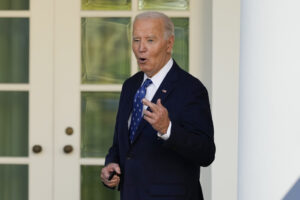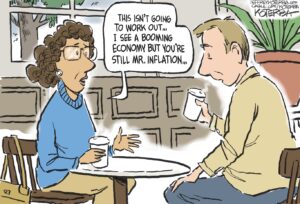One-Trick Elephant
The corpse has a pulse. Or at least the Bush White House and congressional Republicans are counting on the predictable thump, thump, thump about taxes to resuscitate themselves.WASHINGTON — The corpse has a pulse. Or at least the Bush White House and congressional Republicans are counting on the predictable thump, thump, thump about taxes to resuscitate themselves.
To Republicans, the tax issue is a political pacemaker, inserted to restore normalcy in the order of things. They need to inject a steady rhythm into a world that has become a chaotic and frightening place, where none of the usual tricks — not whipping up fear of terrorism or gays or immigrants or even the now-unmentionable one — Osama bin Laden, convinces the public that they are to be trusted with governance.
In the past few weeks, we have heard the president oppose an increase in the tobacco tax to pay for health insurance for needy children. He has opposed an increase in the gasoline tax — a temporary one — to pay for highway and bridge repairs. No cause is sufficiently worthy — not getting kids to a doctor or preventing another deadly rush-hour collapse of any one of our thousands of aging, creaking bridges — that it might be paid for by asking for some small sacrifice.
This is the Bush character. He has so far spent half a trillion dollars on the war in Iraq without blinking, and without seeking a temporary war tax or any other way to pay for it except through deficits and a mounting debt.
Now comes the push to cut corporate income tax rates. It is billed as a job-saving measure.
American economic competitiveness would be enhanced through this tax cut, the administration argues, because many U.S. trading rivals already have slashed business tax rates. This happens to contain some truth, international economists say, though they place varying degrees of emphasis on how much of a role taxes play. “It’s very hard to disentangle the tax rate from all the other things that determine foreign investment,” says C. Fred Bergsten, director of the Peterson Institute for International Economics.
We have had seven years now of a White House that has ignored if not managed to worsen the burdens American workers shoulder because of globalization. Nothing is done to relieve either employers or workers of the health insurance monster. Little has been accomplished toward the business-backed goal of creating a better-educated work force; the sinful inequality in educational opportunities and outcomes endures. Bush’s answer to the inexorable and unfair erosion of private pensions for average workers was to propose privatizing — and thus making less secure — Social Security.
So will this administration engineer a corporate tax overhaul in good faith? Or to put it another way, why would it start promoting good government now?
The president says he wants to “simplify the [tax] code” and would proceed only if a plan raises the same amount of revenue that comes in now. The idea would be to eliminate deductions and loopholes and take money from these givebacks to lower rates. Bush calls this “shorthand for ‘certain deductions would be taken away.’ ” But, he adds, “powerful interests” have worked to get their favored preferences into the tax code.
Like, say, the oil industry.
Just two years ago, when gas prices were climbing and industry profits were soaring, Bush proposed and won from a Republican-controlled Congress $14.5 billion in new tax breaks for energy companies, promoted as a way to ease American dependence on foreign oil. House Democrats have just passed a measure to redirect those breaks to renewable energy sources and conservation. Bush has threatened to veto it.
Is there any reason to believe that a corporate-tax proposal from this White House won’t open a bidding bazaar in which the likely outcome isn’t “simplification” but simply a big business tax cut? I can’t imagine one.
Isn’t it just as likely that the White House will one day revise its rationale, and sell the business-tax cut as a cure-all for the economic crisis of moment? Soon enough, we may well hear that the utterly unrelated credit crisis brought on by loose mortgage lending could somehow be soothed through lower corporate tax rates. This is how Bush’s 2000 campaign promise of drastically lower individual taxes — which began as fodder for Republican primaries — was remarkably transformed into a recession-fighting necessity in 2001.
As it was, so it is likely to be. This latest tax craze isn’t really about saving jobs that Bush has heretofore shown little concern over losing. It’s an effort to save Republicans from a worse political circumstance than that which afflicts them now.
Marie Cocco’s e-mail address is mariecocco(at)washpost.com.
© 2007, Washington Post Writers Group
Your support is crucial…With an uncertain future and a new administration casting doubt on press freedoms, the danger is clear: The truth is at risk.
Now is the time to give. Your tax-deductible support allows us to dig deeper, delivering fearless investigative reporting and analysis that exposes what’s really happening — without compromise.
Stand with our courageous journalists. Donate today to protect a free press, uphold democracy and unearth untold stories.









You need to be a supporter to comment.
There are currently no responses to this article.
Be the first to respond.